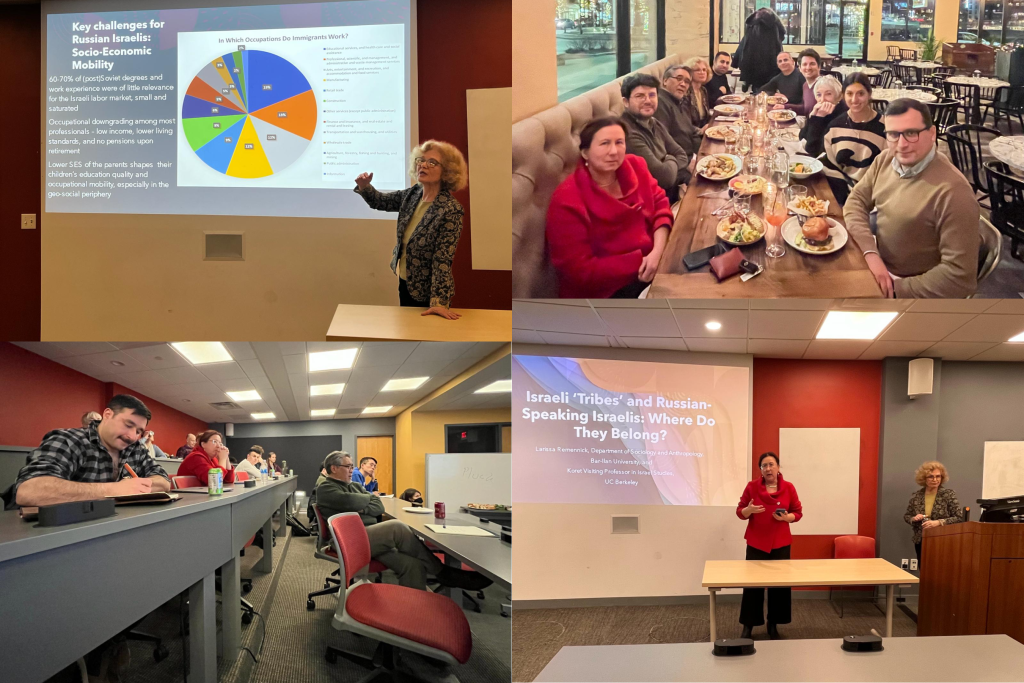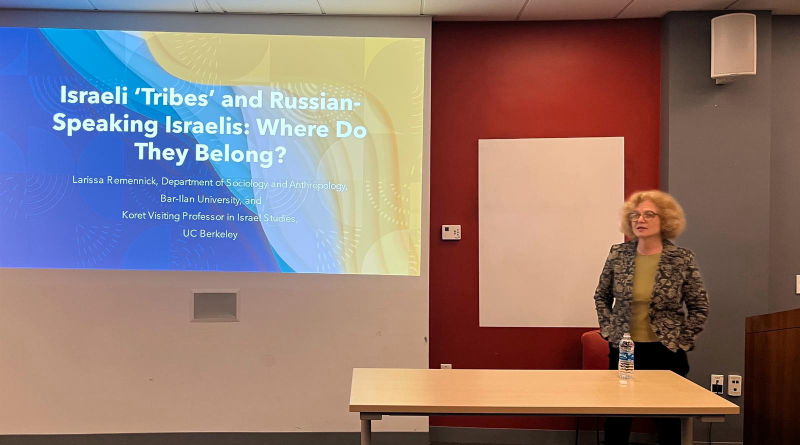Larissa Remmenick on the Sociology of Russian-Speaking Israelis
By Ariel Fanger, alumna of The Fletcher School
On January 30, 2024, the Department of International Literary and Cultural Studies, the Hebrew Program, the Russian Program, and the Fletcher Russia and Eurasia Program at Tufts University hosted Larissa Remennick, Professor of Sociology at Bar-Ilan University, for a guest lecture about Russian speakers in Israel titled, “The Sixth Tribe? A Socio-Cultural Sketch of ‘Russian Israel.'”
Remennick, who emigrated to Israel from Moscow as a young Ph.D. student in the early 1990s, focuses her research on the “Great Aliya,” or movement of Russian immigrants to Israel, put in motion by the Soviet collapse and post-communist transition, as well as the impact this has made on Israeli society today.
Per the event title, Remennick built her presentation around the concept of tribes, or shevatim in Hebrew. As she described the diverse composition of Israeli society comprised of immigrants from more than 70 countries, Remennick noted that while the country is pluralistic and diverse, it remains divided along tribal lines. She added that Israel is a “united front on the outside but fragmented on the inside,” not only politically and religiously, but also between veterans or sabras and new immigrants. This provided a relevant and contextually important introduction to her presentation.
Ex-Soviet Israelis or rusim, as Remennick refers to them, comprise nearly 40% of all ethnic origin groups of Israeli Jews. A dynamic and diverse group, their varied immigration timelines offer a nuanced glimpse into the individual experiences that shape their presence in Israel. Remennick described how those who came to Israel from the recently collapsed Soviet Union in the 1990s primarily see themselves as secular Jewish nationalists and identify as conservatives on the political spectrum. Conversely, immigrants from the early 2000s known as “Generation 1.5” were often brought to Israel as teenagers by their parents, tend to be less integrated into Israeli society, speak limited Hebrew, have a higher propensity to marry non-Jews, and are generally more politically liberal than their “Generation 1” counterparts. People in “Generation 2,” largely the children of Generation 1.5 immigrants, generally speak Hebrew and English, are educated in Israel, lean politically left, and feel more compelled to seek work opportunities outside of Israel.
The initial waves of Russian immigrants to Israel have encountered a multitude of challenges as they navigate the complexities of integration into Israeli society. Namely, many new immigrants are compelled by economic disadvantage to live in peripheral areas with lower living standards. Despite this reality, many Russian immigrants pursued higher education, with nearly 60% of ex-Soviet Jews in Israel having earned higher education credentials. However, many of these well-educated immigrants found it challenging to break into the labor market even though they held high-level jobs in the former Soviet Union. While many Russian immigrants anticipated that their skills and education would secure employment comparable to their pre-emigration positions, Remennick discovered that 60-70% of post-Soviet degrees and work experiences hold limited relevance in the Israeli labor market. As a result, Russian immigrants are often subject to an occupational downgrade.

Remennick poignantly addressed additional challenges faced by Russian immigrants, delving into the nuanced aspects of their identity, their Jewishness, and their sense of belonging. This struggle is deeply rooted in their experiences as Jews in the former Soviet Union and persists as they navigate their identity in the context of Israel. Many Russian immigrants find that their Jewish identity is not completely believable because they grew up detached from Jewish tradition and religion. Notably, pervasive anti-Semitism in the former Soviet Union compelled Jews to transform their initially stigmatized Jewish identity into a positive one upon resettling in Israel.
Given both the lack of Jewish culture in the Soviet Union after World War II and government suppression of religion writ-large, many Russian Jews did not grow up understanding or observing Judaism. Remennick noted, “I myself did not even see Hebrew letters until my arrival in Israel.”
While they share the same background, many veteran Ashkenazi Jews in Israel do not recognize the Russian Jews as their own ilk. Remennick also highlighted the uniquely challenging ordeal faced by individuals with paternal Jewish lineage and Jewish surnames in Russia who encountered harassment and discrimination in Russia for their Jewish identity. Paradoxically, upon immigrating to Israel, they found themselves excluded from Jewish identity recognition, as Judaism is traditionally determined matrilineally.
As Remennick spoke about later in her discussion, Generations 1.5 and 2 are more politically active than Generation 1. They participate in civic activism, volunteer, and protest. The younger generation has ingeniously employed a form of civil resistance, organizing public weddings for immigrant couples who lack recognition as Jews in rabbinical courts, thereby challenging societal norms. They do not see their subversion in Israeli society as acceptable and hope to alter the status quo.
Remennick concluded her presentation by noting that Israel sees the ex-Soviet Aliya as an asset, given the mass influx of free human capital that contributes significantly to nation-building. However, for Russian Jews immigrating, it has been a mixed blessing.

